If you’ve just welcomed a new puppy into your home, you may be wondering why milk is coming out of their nose when nursing.
This can be a bit alarming, but it’s actually completely normal! In this blog post, we will explore the reasons behind this phenomenon and provide some tips for ensuring that both mother and pup are healthy and happy.
Milk coming out of a puppy’s nose when nursing can be caused by several factors, including overfeeding, incorrect positioning during feeding, drinking too quickly, or a physical issue that might need veterinary attention.
Why Is Milk Coming Out Of Puppy’s Nose When Nursing?
Milk can be coming out of the puppy’s nose when nursing if the puppy is nursing too vigorously and is swallowing air along with the milk.
Milk coming out of a puppy’s nose when nursing can be caused by several factors, including overfeeding, incorrect positioning, interrupting nursing sessions, or a birth defect like a cleft palate.
Overfeeding
In some cases, puppies may get too much milk too quickly, which can lead to the milk coming out of their nose. This is often the case with bottle-fed pups or those who are particularly eager feeders.
As a vet, I’ve seen this happen when caregivers are not aware of the correct amount to feed, leading to overfeeding. It’s crucial to regulate feeding and ensure pups are not consuming more than they can handle.
Incorrect Positioning
The position in which puppy nurses can also impact whether milk comes out of their noses. If the puppy is not correctly positioned on the teat, they might ingest air along with the milk, causing them to expel the milk through their nose.
In my practice, I encourage caregivers to ensure proper positioning during nursing to prevent this from happening.
According to a case study done by MDPI, over 38% of dogs experience reverse sneezing.
Interrupted Nursing Sessions
Interrupted nursing sessions can also lead to milk coming out of a puppy’s nose. When a pup’s feeding is abruptly disturbed, they might choke on the milk, causing it to come out through the nose. It’s always best to ensure that nursing sessions are calm and uninterrupted.
Birth Defects
In some unfortunate instances, milk coming out of a puppy’s nose could be a sign of a birth defect, like a cleft palate.
This is a more serious cause and needs immediate veterinary attention. I recall a case where a puppy with this condition was brought into my clinic. We were able to diagnose the issue early and provide the necessary care, which greatly improved the pup’s quality of life.
(See also: Fading Puppy Syndrome: Everything You Need To Know)
What To Do If Milk Comes Out Of Puppy’s Nose?
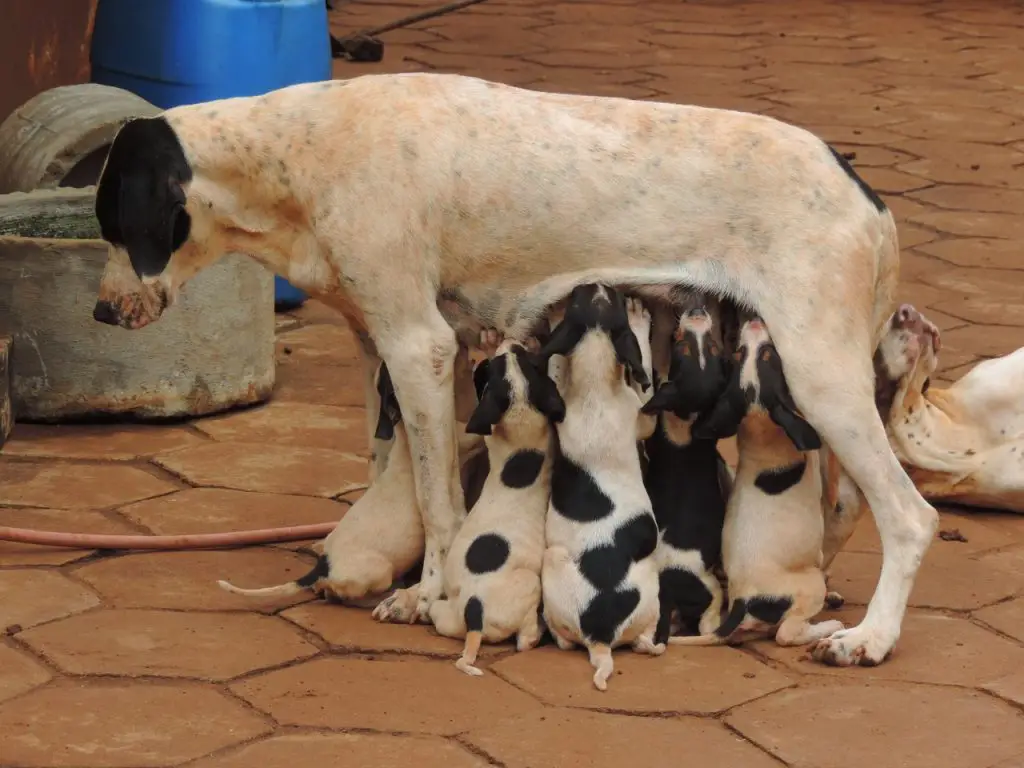
Milk coming out of a puppy’s nose might look concerning, but it’s actually quite normal and not something to worry about. The best thing you can do is to stay calm and wait for the episode to pass. You may want to gently rub your puppy’s chest or throat to help relax them during a bout of reverse sneezing.
Monitor the Situation
The first step is to closely observe the puppy’s feeding habits. If the milk coming out of the nose is a one-off incident, it may not be a cause for concern.
However, if it happens frequently, it could indicate a problem. During my time as a vet, I have encouraged caregivers to keep a close eye on their puppies during feeding times to ensure they are eating properly and comfortably says Dr. Ivana Crnec (DVM).
Seek Veterinary Assistance
If the issue persists, it’s important to consult with a vet. They will be able to conduct a thorough examination to determine the root cause of the problem. I’ve treated numerous cases where a timely visit to the vet resulted in early diagnosis and effective treatment.
Adjust Feeding Techniques
Depending upon the vet’s advice, adjusting the feeding techniques might be necessary. This could involve ensuring the puppy is correctly positioned during nursing or regulating the amount of milk they consume to prevent overfeeding.
In my practice, I’ve seen significant improvements in puppies’ health with these simple adjustments.
Check for Birth Defects
In some cases, consistent milk discharge from the nose could be a symptom of a birth defect like a cleft palate, which requires immediate attention. In such situations, veterinary intervention is crucial for proper treatment.
I remember one case where a puppy was diagnosed with a cleft palate, and we were able to provide the necessary care to improve its quality of life.
(Related: How Often Should Newborn Puppies Nurse?)
How To Prevent Milk Coming Out of My Puppy’s Nose While Nursing
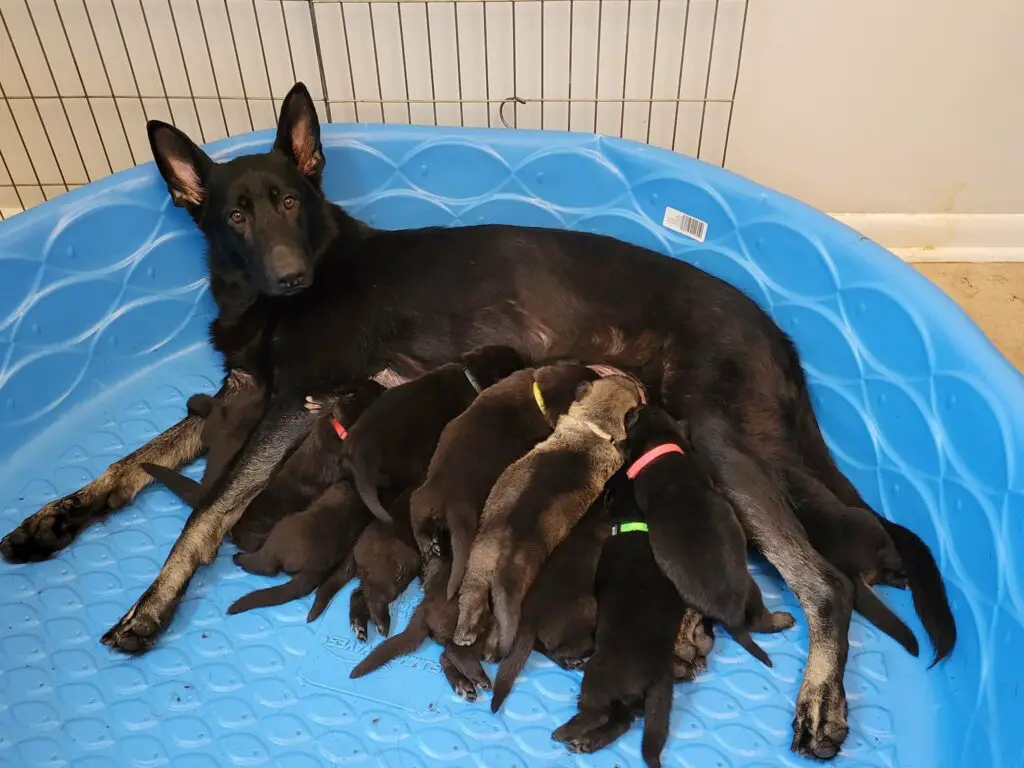
To prevent milk from coming out of your puppy’s nose while nursing, ensure proper positioning during feeding, avoid overfeeding, and allow for breaks in between nursing sessions.
Proper Positioning
Ensure that the puppy is correctly positioned while nursing. Improper positioning can lead to milk coming out of the puppy’s nose.
The puppy should be on its stomach, with its head straight and not tilted upwards or downwards. This position allows for natural swallowing and decreases the chances of milk entering the nasal passage.
Avoid Overfeeding
Overfeeding can also cause milk to come out of a puppy’s nose. If a puppy is consuming more milk than it can handle, the excess might end up coming out through the nose. Monitor the amount of milk the puppy drinks and adjust accordingly.
If you notice that milk tends to come out of the puppy’s nose after nursing, it might be a sign that the puppy is being overfed says Dr. Becky Lundgren, DVM.
Breaks During Nursing Sessions
It’s important to allow for breaks during nursing sessions. These breaks give the puppy time to digest the milk and help prevent milk from coming out of their nose. If a puppy is nursing too vigorously without any breaks, it might end up with milk in its nasal passage.
Therefore, try taking the puppy off halfway through the feed to allow the food to settle in its belly.
Regular Vet Checks
Finally, regular vet checks are essential. Milk coming out of the nose could be a sign of an underlying health issue like a cleft palate.
Your vet will be able to diagnose any potential problems and provide appropriate treatment or advice.
How Do I Know If My Puppy Has Milk In His Lungs?
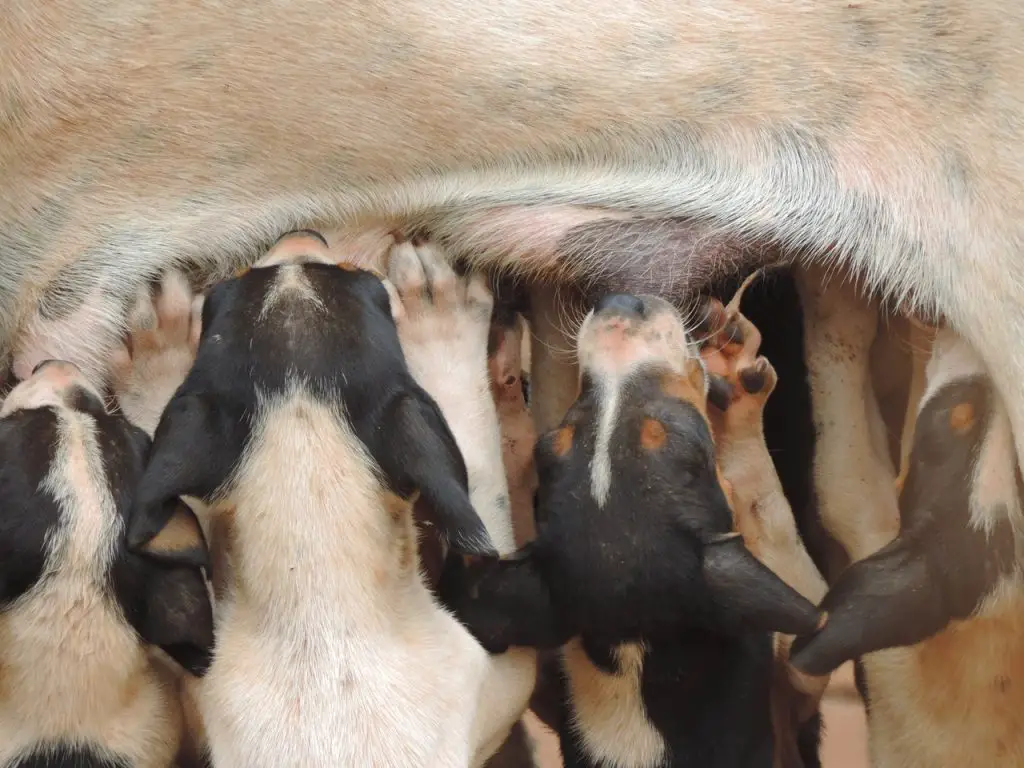
If your puppy is having trouble breathing, it could be a sign that he has milk in his lungs. Other signs include coughing and wheezing. If you think your puppy has milk in his lungs, take him to the vet immediately. Milk in the lungs is a serious condition and can be fatal if not treated promptly.
One way is if the puppy aspirates, or inhales, milk into its lungs while nursing. This can happen if the pup is lying on its back and swallows large amounts of milk, which then goes down the wrong pipe and enters the lungs instead of the stomach.
Milk aspiration can also occur when a dog’s position changes suddenly while it’s nursing, causing milk to be forced up into the lungs. Puppies have small airways and their immune system is not yet fully developed, so they are more susceptible to pneumonia from milk aspiration than adult dogs.
If you have a newborn puppy, it’s important to watch for signs of respiratory distress. Milk in the lungs is a common problem in newborn puppies and can be deadly if not treated quickly according to Berkeley Animal Hospital.
If your puppy has milk in its lungs, the first thing you should do is take it to the vet. Milk in the lungs is a serious condition and can be fatal if not treated immediately. If your puppy is having difficulty breathing, or if its chest sounds wet when you listen to it with a stethoscope, these are signs that it may have milk in its lungs.
Treatment for this condition typically includes antibiotics and oxygen therapy. In severe cases, surgery may be necessary to remove the milk from the lungs. With prompt treatment, most puppies recover fully from milk in their lungs and go on to lead healthy lives as per AKC.
(Related: How To Care For a Newborn Litter of Puppies [Complete Guide]
What Happens If Milk Gets In Puppies’ Lungs?
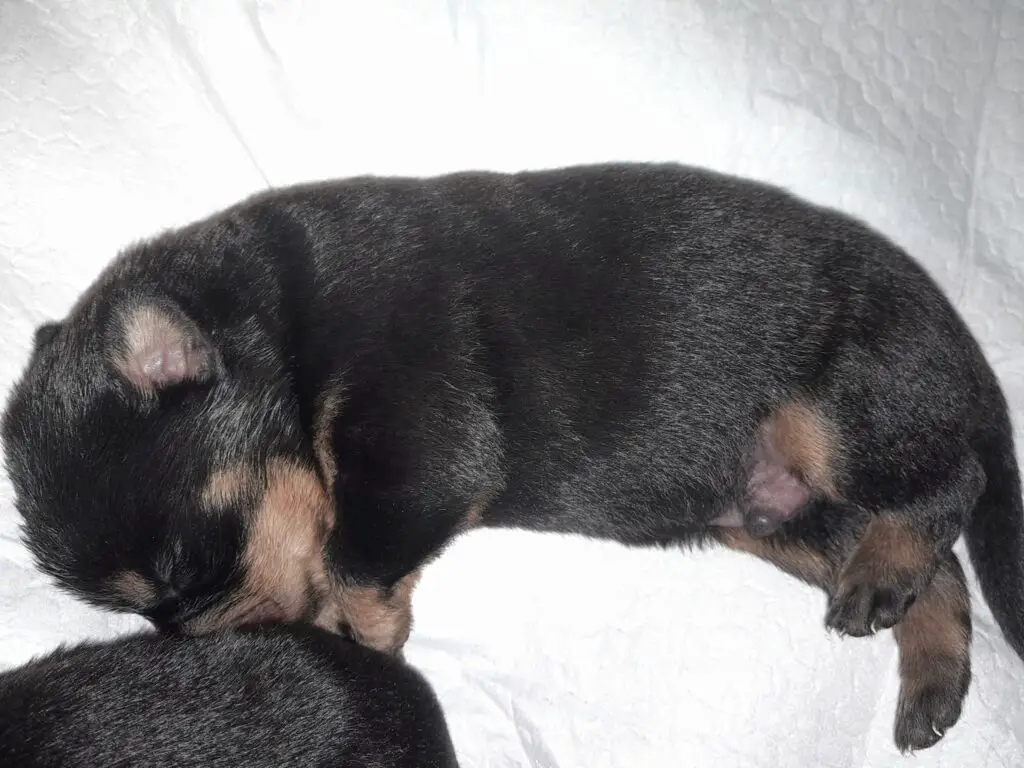
If milk gets into a puppy’s lungs, it can cause serious health complications. This occurs when there is an aspiration of milk rather than regular breathing.
Milk that gets aspirated into the lungs can lead to inflammation or even pneumonia if not treated quickly and correctly.
Signs of aspiration pneumonia in puppies include:
- Labored breathing
- Coughing
- Lethargy
- Lack of appetite
- Fever
If your puppy is showing any of these symptoms after having milk enter their lungs, you should take them to the vet for diagnosis and treatment immediately.
Depending on the severity of the condition, your vet may prescribe antibiotics or other medications to help clear up the infection and reduce inflammation in the lungs.
If left untreated, aspiration pneumonia can be fatal in puppies says Vet Cornell Edu.
(See also: How Long Can Newborn Puppies Go Without Nursing?)
Why Do Puppies Aspirate Milk?
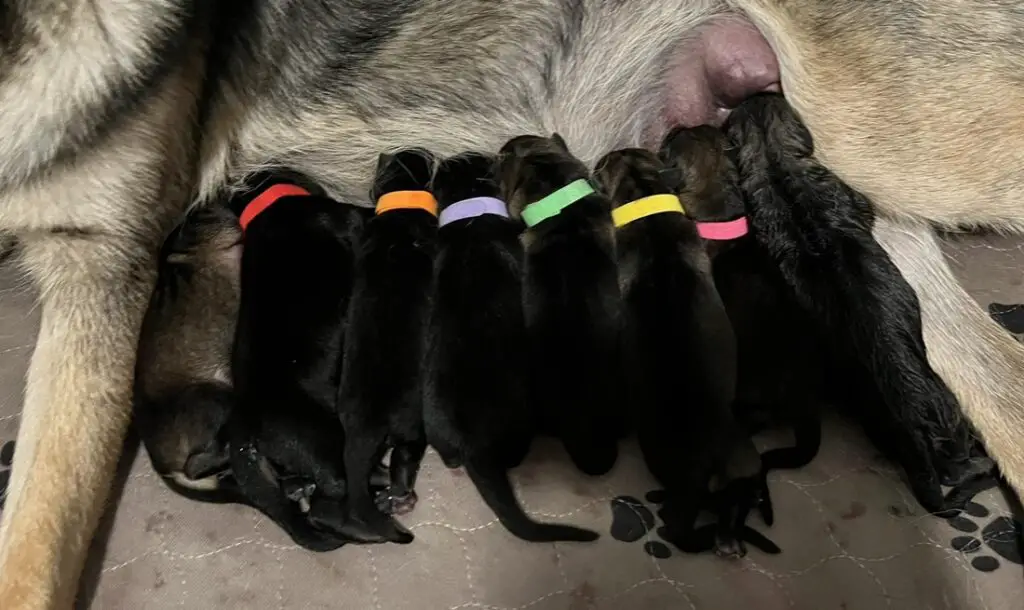
There are several reasons why puppies may aspirate milk. One reason is that they are born with a small stomach and large intestines. This makes it difficult for them to digest milk properly. Another reason is that puppies have weak muscles in their throats and esophagus. This makes it hard for them to keep food and liquids down.
Puppies are born without the ability to swallow. Instead, they have a reflex called the “gag reflex” that helps them keep their mouths clean and prevents them from choking. When a puppy tries to drink milk, the milk goes into its stomach instead of its intestines.
This can cause an infection called aspiration pneumonia. Aspiration pneumonia is a serious condition that can be fatal if not treated promptly.
Puppies who aspirate milk may have difficulty breathing, noisy breathing, coughing, or vomiting. If you think your puppy may be aspirating milk, it is important to take them to the vet immediately says PetMD.
Treatment for aspiration pneumonia typically includes antibiotics and oxygen therapy. With prompt treatment, most puppies make a full recovery.
According to a study done in Spain by Science Direct, reverse sneezing is not associated with trigger factors.
There are several things you can do to prevent your puppy from aspirating milk:
- Make sure your puppy is with its mother when it eats. The mother will help the puppy learn how to swallow correctly.
- Do not give your puppy solid food until it is at least six weeks old. Puppies cannot digest solid food properly and it can cause them to aspirate milk into their lungs.
- If you must bottle feed your puppy, make sure you are holding the bottle correctly. The nipple should be in the puppy’s mouth, not pointing up. You should also support the puppy’s head so it does not tilt back and aspirate milk into its lungs says Dixie Animal Hospital.
4 Week Old Puppy Sneezing Milk
If a 4-week-old puppy is sneezing milk, it might be overfed or have a condition like a cleft palate or reverse sneezing, and you should monitor its health and consult with a veterinarian if symptoms persist or other concerns arise.
Reverse sneezing is a respiratory event, not a disease or illness, and is usually caused by irritation or inflammation of the nasal, pharyngeal, or sinus passages.
However, a more serious concern could be a birth defect called a cleft palate, which allows food and liquids to enter the nasal passages.
This defect can lead to milk coming out of the nose and may require veterinary attention.
If the puppy exhibits other symptoms such as difficulty breathing, it could have aspirated milk into its lungs, which can lead to pneumonia, a potentially life-threatening condition says VCAHospitals.
When To Seek Veterinary Assistance
Veterinary assistance should be sought if milk consistently comes out of a puppy’s nose when nursing, as this could be indicative of underlying issues such as overfeeding, incorrect positioning, interruptions during feeding, or more serious conditions like birth defects.
If the occurrence of milk coming out of a puppy’s nose isn’t isolated and happens frequently, it’s definitely time to consult a vet. Persistent nasal discharge of milk can lead to aspiration pneumonia, a potentially life-threatening condition that requires immediate veterinary intervention.
Also, if the puppy shows signs of distress, difficulty breathing, or if they’re not gaining weight despite regular feedings, these are clear indications that you need to seek veterinary care. In my experience as a veterinarian, these signs often suggest medical issues that need to be addressed promptly.
A vet will be able to conduct a thorough examination to identify the root cause and recommend appropriate treatment or adjustments in feeding techniques.
In cases where a birth defect like a cleft palate is causing the issue, early detection and intervention can significantly improve the puppy’s quality of life. Remember, when in doubt, it’s always best to consult with a professional says Purina.
FAQs
Q: What is a cleft palate?
A: A cleft palate is a birth defect where there is a gap or opening in the roof of the mouth. This opening can make it difficult for puppies to nurse properly as they may have difficulty creating a proper seal around the mother’s nipple or a bottle. It can also lead to milk coming out of the nose as the puppy may not be able to effectively swallow and control the flow of milk.
Q: How is a cleft palate diagnosed?
A: A cleft palate can usually be diagnosed by a veterinarian during a physical examination. They will look for any visible gaps or openings in the roof of the mouth. In some cases, a more detailed examination such as an X-ray or endoscopy may be needed to confirm the diagnosis and assess the severity of the cleft palate.
Q: Can a cleft palate be repaired?
A: Yes, a cleft palate can be repaired through surgery. The specific surgical procedure will depend on the severity and location of the cleft palate. It is important to discuss the surgical options with a veterinarian who specializes in veterinary dentistry or oral surgery.
Q: Can puppies with a cleft palate still thrive?
A: With proper management and care, puppies with a cleft palate can still thrive. It is essential to work closely with a veterinarian to develop a feeding plan that meets the puppy’s nutritional needs. In some cases, supplementing with a specialized milk replacer or using a specialized bottle may be necessary to ensure the puppy receives proper nourishment.
Q: Can milk coming out of a puppy’s nose cause any health issues?
A: If milk consistently goes into a puppy’s nasal passages, it can lead to respiratory problems or pneumonia. Aspiration of milk can cause irritation and inflammation in the respiratory tract, which can potentially lead to infections. It is important to monitor your puppy closely and seek veterinary care if you notice any signs of respiratory distress or other health issues.
Q: Are there any home remedies to prevent milk from coming out of a puppy’s nose while nursing?
A: It is always best to consult with a veterinarian for proper guidance on managing this issue. While there may be some home remedies suggested by others, it’s important to remember that each puppy’s situation is unique, and what works for one may not work for another. To ensure the health and well-being of your puppy, it is recommended to get professional advice from a veterinarian.
Q: Can milk coming out of a puppy’s nose be a sign of other health problems?
A: While milk coming out of a puppy’s nose can be related to nursing issues or a cleft palate, it can also be a symptom of other health problems. One potential cause is a respiratory infection or blockage in the nasal passages. If you are concerned about your puppy’s health or notice any other symptoms such as coughing, sneezing, or difficulty breathing, it is best to consult with a veterinarian for a proper evaluation.
Q: Is it normal for a small amount of milk to come out of a puppy’s nose occasionally?
A: A small amount of milk coming out of a puppy’s nose occasionally may not necessarily be a cause for concern. Puppies can sometimes get overexcited while nursing, and a small amount of milk may momentarily go into their nasal passages. However, if you notice a consistent or significant amount of milk coming out of their nose, it is advisable to have them evaluated by a veterinarian.
Conclusion and final thoughts
Milk coming out of a puppy’s nose when nursing can be attributed to several factors. It may occur if the puppy is nursing too vigorously, swallowing air along with milk, or overfeeding.
It could also be a sign of a birth defect like a cleft palate. Another potential cause is a condition known as reverse sneezing.
While it could just be a case of the puppy learning to manage the flow of milk, it’s advisable to have the puppy checked by a vet to rule out any serious health issues.
Regular monitoring of the puppy’s feeding habits and overall health is crucial in ensuring its well-being.




